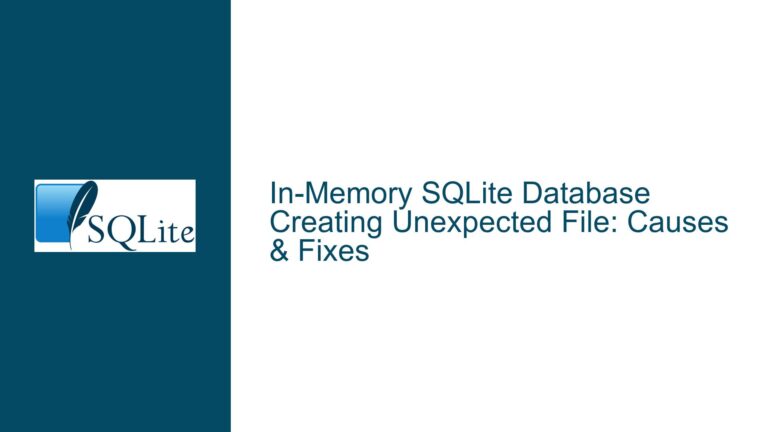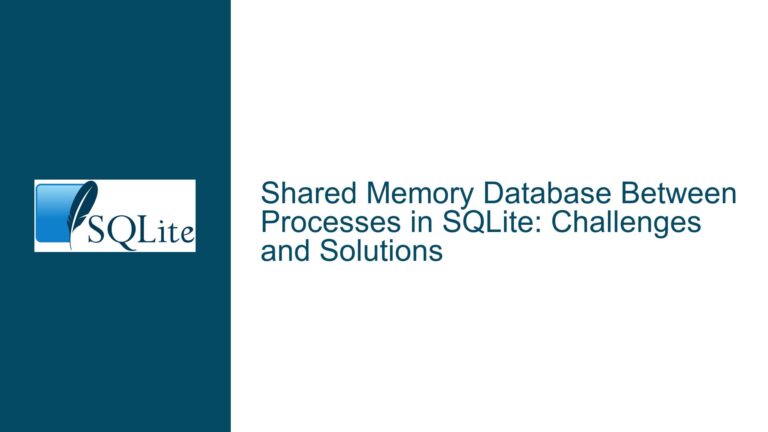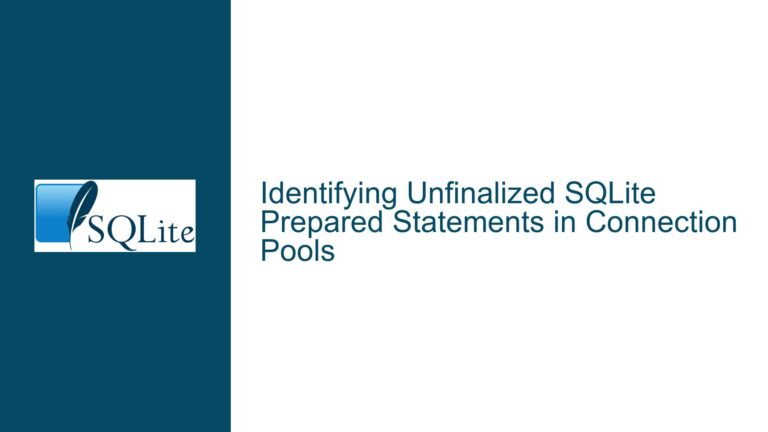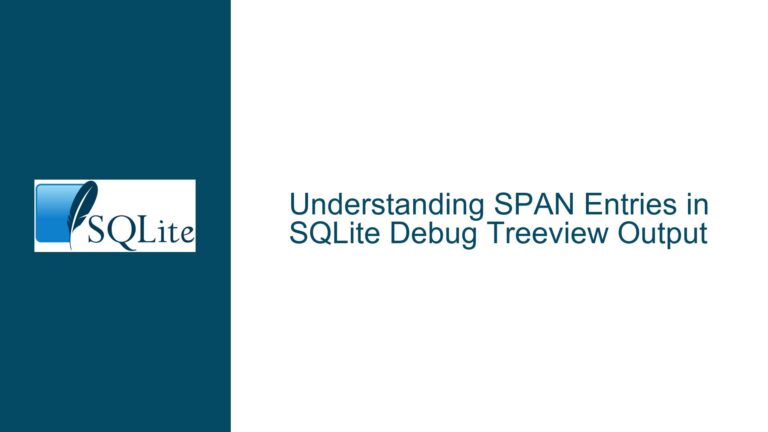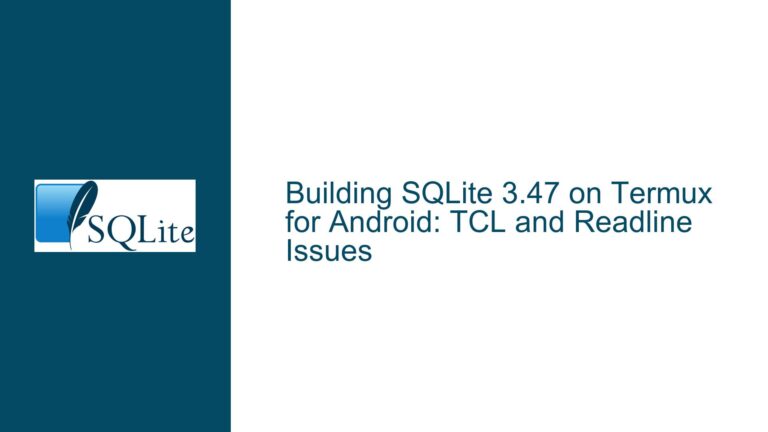Valgrind Detects Memory Leaks When Using SQLite3 String Building Functions
Memory Management Behavior of SQLite3 String Building APIs
String Object Lifecycle and Ownership Semantics
The SQLite3 string building API (sqlite3_str) provides a structured way to construct dynamic strings through functions like sqlite3_str_new(), sqlite3_str_appendchar(), and sqlite3_str_finish(). A critical aspect of these APIs lies in their memory ownership model. When sqlite3_str_finish() is called, it performs two operations:
- It finalizes the string buffer and returns a pointer to a heap-allocated C-string
- It resets the sqlite3_str object to an empty state but does not deallocate the object itself
The returned C-string from sqlite3_str_finish() is allocated via sqlite3_malloc64(), requiring explicit deallocation with sqlite3_free(). Failure to free this pointer constitutes a memory leak. The sqlite3_str object itself (created by sqlite3_str_new()) is managed internally by SQLite’s memory subsystem and will be automatically freed during sqlite3_shutdown() or when using the default allocator.
Valgrind’s leak report specifically identifies 24 bytes lost because the sample code captures the output of sqlite3_str_finish() but never passes it to sqlite3_free(). The 24-byte allocation corresponds to the string buffer containing ten ‘x’ characters plus null terminator, rounded up by the memory allocator’s block size alignment.
Interaction Between String Reset and Memory Release
The sqlite3_str_reset() function clears the content of the sqlite3_str object but preserves its allocated buffer for future reuse. This explains why uncommenting sqlite3_str_reset() in the sample code eliminates the Valgrind leak: resetting prevents sqlite3_str_finish() from generating a new buffer, instead returning NULL because the string is empty. However, this is a red herring in troubleshooting because it masks the actual problem of missing sqlite3_free() rather than solving it.
In production code where non-empty strings are being built, relying on sqlite3_str_reset() without proper buffer management will still result in leaks when sqlite3_str_finish() eventually produces valid pointers. The reset function serves optimization purposes, not memory management ones.
Error Code Validation Pitfalls
While the original code checks sqlite3_str_errcode() before and after append operations, this only verifies that string-building operations succeeded, not whether the finished buffer was properly handled. SQLITE_OK from sqlite3_str_errcode() indicates the append operations didn’t encounter errors (e.g., memory allocation failures), but it provides no insight into whether the application correctly managed the finished string buffer.
Root Causes of Unfreed Memory in String Building Workflows
Neglecting Return Value from String Finalization
The most fundamental error stems from ignoring the pointer returned by sqlite3_str_finish(). Developers accustomed to APIs where finishing operations automatically clean up resources might incorrectly assume sqlite3_str_finish() handles deallocation internally. In reality:
char *result = sqlite3_str_finish(str); // Must be saved and freed
sqlite3_free(result); // Required cleanup
Omitting this step leaves the string buffer orphaned in memory until process termination. This is particularly insidious because the sqlite3_str object itself is managed by SQLite, creating a false sense of automatic memory management.
Misunderstanding Thread-Local Storage Dependencies
When using SQLite’s thread-local storage (TLS) features or alternative memory allocators, the ownership rules become stricter. If sqlite3_str_new() is called with a non-zero database handle pointer to use a specific allocator, the finished buffer must be freed using the same allocator context. Mixing sqlite3_free() with custom allocators without proper context tracking can leave buffers allocated through untracked channels.
Buffer Recycling Without Ownership Transfer
Applications that reuse sqlite3_str objects across multiple build/finish cycles risk leaking buffers if they don’t capture and free each iteration’s output:
sqlite3_str *str = sqlite3_str_new(0);
for(int i=0; i<10; i++){
build_string(str);
char *buf = sqlite3_str_finish(str); // Must collect each iteration
use_string(buf);
sqlite3_free(buf); // Required per iteration
}
Failing to free buf inside the loop leaks all previous buffers, even though the sqlite3_str object itself remains valid.
Comprehensive Strategy for Leak Detection and Prevention
Instrumentation of String Finalization Workflows
Modify code to systematically capture and release finished string buffers:
void safe_string_construction() {
sqlite3_str *str = sqlite3_str_new(0);
if(!str) { /* handle OOM */ }
sqlite3_str_appendchar(str, 10, 'x');
char *result = sqlite3_str_finish(str);
if(result) {
/* Process result */
sqlite3_free(result); // Mandatory cleanup
}
// str object is now invalid; do not reuse
}
Implement wrapper functions that enforce this pattern:
char *managed_str_finish(sqlite3_str *str) {
char *buf = sqlite3_str_finish(str);
if(buf) {
sqlite3ShutdownHook.register_cleanup(buf, sqlite3_free);
}
return buf;
}
(Where sqlite3ShutdownHook is a hypothetical cleanup registry mechanism)
Valgrind Suppression File Tuning
For complex applications where third-party libraries generate benign leaks, create a Valgrind suppression file to ignore known safe allocations while focusing on application-specific issues. However, never suppress warnings related to sqlite3_str_finish() buffers unless thorough analysis confirms they’re intentionally retained.
Example suppression entry (not recommended for this specific leak):
{
sqlite3_str_benign_leak
Memcheck:Leak
match-leak-kinds: definite
fun:sqlite3Realloc
fun:sqlite3StrAccumEnlarge
fun:sqlite3_str_appendchar
}
Static Analysis Integration
Use Clang’s AddressSanitizer (-fsanitize=address) and LeakSanitizer alongside Valgrind:
clang -fsanitize=address -g valg.c sqlite3.c -o valg
./valg
AddressSanitizer provides faster leak detection with stack traces pinpointing allocation sites.
Unit Test Design for Memory Hygiene
Develop test cases that validate both successful and failed string construction scenarios:
TEST(StringTests, FinishedBufferFreed) {
sqlite3_str *str = sqlite3_str_new(0);
char *buf = sqlite3_str_finish(str);
ASSERT_NOT_NULL(buf);
sqlite3_free(buf);
ASSERT_EQ(sqlite3_memory_used(), 0); // Verify allocator balance
}
Leverage SQLite’s sqlite3_memory_used() function to confirm net zero allocations after cleanup.
Memory Accounting Wrappers
In debug builds, replace the default allocator with instrumented versions:
void *tracked_malloc(size_t sz) {
void *p = real_malloc(sz);
memory_accounting_add(p, sz);
return p;
}
void tracked_free(void *p) {
memory_accounting_remove(p);
real_free(p);
}
sqlite3_config(SQLITE_CONFIG_MALLOC, &tracked_malloc, &tracked_free);
This allows tracking all SQLite-originated allocations, flagging any unfreed buffers from sqlite3_str_finish().
Code Review Checklists for SQLite String APIs
Institutionalize review practices that verify:
- Every sqlite3_str_finish() call is paired with sqlite3_free()
- No intermediate sqlite3_str_reset() calls discard buffers without finishing
- Error paths after sqlite3_str_new() or append operations still clean up finished buffers
- Custom allocators implement matching deallocation for finished buffers
Performance Optimization Without Compromise
For high-throughput string building scenarios where frequent allocation/free cycles impact performance:
A) Buffer Recycling Pool
Maintain a thread-local pool of pre-allocated buffers:
#define POOL_SIZE 10
__thread char *buffer_pool[POOL_SIZE];
__thread int pool_index = 0;
char *get_buffer() {
if(pool_index > 0) return buffer_pool[--pool_index];
return sqlite3_malloc(INITIAL_BUFFER_SIZE);
}
void release_buffer(char *buf) {
if(pool_index < POOL_SIZE) buffer_pool[pool_index++] = buf;
else sqlite3_free(buf);
}
B) Delayed Batch Freeing
Accumulate buffers in a linked list and free them during idle periods:
struct BufferList {
char *buf;
struct BufferList *next;
};
void batch_free(struct BufferList *head) {
while(head) {
struct BufferList *next = head->next;
sqlite3_free(head->buf);
free(head);
head = next;
}
}
These strategies reduce allocator contention while ensuring no buffers leak permanently.
Debugging Complex Leak Scenarios
When facing intermittent leaks:
Log Allocations with Backtraces
Use backtrace() and backtrace_symbols() to record where each sqlite3_str_finish() buffer is allocated:#include <execinfo.h> char *logged_str_finish(sqlite3_str *str) { char *buf = sqlite3_str_finish(str); if(buf) { void *array[10]; size_t size = backtrace(array, 10); char **strings = backtrace_symbols(array, size); log_alloc(buf, strings); free(strings); } return buf; }Use Watchpoints on Buffer Addresses
In GDB, set hardware watchpoints on leaked buffer addresses to catch when they’re last accessed:(gdb) watch *0x617000 (gdb) continueAllocation Site Statistical Sampling
Periodically dump allocation statistics using sqlite3_status():int highwater, current; sqlite3_status(SQLITE_STATUS_MALLOC_COUNT, ¤t, &highwater, 0); printf("Current allocations: %d\n", current);
Anti-Patterns and Subtle Bugs
Double-Free via Stale Pointers
After calling sqlite3_str_reset(), previously finished buffers become invalid:
char *buf1 = sqlite3_str_finish(str); // OK
sqlite3_str_reset(str);
char *buf2 = sqlite3_str_finish(str); // NULL if str is empty
sqlite3_free(buf1); // Correct
sqlite3_free(buf2); // Harmless but unnecessary
Stale Buffer Retention
Holding references to finished buffers beyond their intended scope:
void process_request() {
sqlite3_str *str = sqlite3_str_new(0);
global_pointer = sqlite3_str_finish(str); // Leak if not freed elsewhere
}
Incorrect Allocator Pairing
Mixing system free() with SQLite buffers:
char *buf = sqlite3_str_finish(str);
free(buf); // Undefined behavior; must use sqlite3_free()
Platform-Specific Considerations
Windows CRT Debug Heaps
On Windows, enable debug heaps via _CrtSetDbgFlag to get allocation snapshots:
_CrtSetDbgFlag(_CRTDBG_ALLOC_MEM_DF | _CRTDBG_LEAK_CHECK_DF);
This reports leaks at process exit, showing call stacks for unfreed SQLite buffers.
Address Space Layout Randomization (ASLR)
When analyzing core dumps, disable ASLR to stabilize allocation addresses:
setarch x86_64 --addr-no-randomize ./application
Custom SQLite Memory Allocators
If using sqlite3_config(SQLITE_CONFIG_MALLOC, …), ensure the custom free function properly handles buffers from sqlite3_str_finish():
void custom_free(void *ptr) {
if(is_sqlite_str_buffer(ptr)) { // Requires metadata tracking
reclaim_str_buffer(ptr);
} else {
generic_free(ptr);
}
}
Evolution of SQLite String APIs
Understanding historical context helps avoid outdated practices:
Legacy String Accumulators
Older SQLite versions used sqlite3_mprintf() and sqlite3_vmprintf(), which required similar careful freeing but lacked the structured sqlite3_str object model.Zero-Copy Optimization Flags
The sqlite3_str API allows access to internal buffers via sqlite3_str_value() before finalization. Misusing this pointer after modification or finish can cause use-after-free errors.Future-Proofing with RAII Patterns
In C++, wrap sqlite3_str in smart pointers:struct SqliteStrDeleter { void operator()(sqlite3_str *str) { char *buf = sqlite3_str_finish(str); sqlite3_free(buf); } }; using UniqueSqliteStr = std::unique_ptr<sqlite3_str, SqliteStrDeleter>; UniqueSqliteStr str(sqlite3_str_new(nullptr)); sqlite3_str_appendchar(str.get(), 10, 'x');
Conclusion
Memory leaks involving sqlite3_str_finish() stem from overlooking the API’s explicit ownership transfer model. By rigorously pairing each finish call with sqlite3_free(), instrumenting allocation tracking, and validating through multiple debugging tools, developers can eliminate these leaks while maintaining performance. The solution transcends mere boilerplate code fixes—it demands a systemic approach to resource ownership auditing within the application’s architecture.

